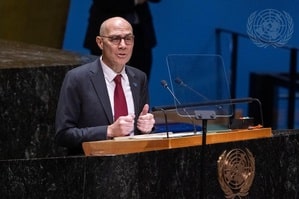A human rights team from the world organisation will visit Dhaka next week to discuss with the interim government investigations into the human rights violations during the recent unrest in Bangladesh, according to a UN Spokesperson.
The High Commissioner for Human Rights, Volker Turk, discussed with Bangladesh interim leader Muhammad Yunus "a comprehensive range of support that the UN Human Rights Office could provide to the interim government and the transition, including on accountability issues," UN Secretary-General Antonio Guterres' Deputy Spokesperson Farhan Haq said on Friday.
The team visiting Bangladesh will discuss with the interim government "areas of support and the modalities for an investigation of human rights violations in the context of the recent violence and unrest," Haq said.
Turk said in a statement issued in Geneva, "A comprehensive, impartial, and transparent investigation into all human rights violations and abuses that have occurred will be a critical first step."
Meanwhile, a report from the Office of the High Commissioner for Human Rights (OHCHR) in Geneva said that Hindus and their temples have been attacked in Bangladesh in the aftermath of Sheikh Hasina's resignation as Prime Minister last week.
The report said, "On August 5 and 6, Hindu houses and properties were reportedly attacked, vandalised and looted in 27 districts."
"A number of places of worship were also damaged, including an ISKCON (Hare Krishna) temple in Meherpur, Khulna division, which was vandalised and set on fire," the report added.
The report said that in response to the attacks on minorities, "various student organisations and other ordinary people have been reportedly forming groups to protect minorities and maintain vigilance over religious sites belonging to minority communities."
The interim government's Religious Affairs Adviser AFM Khalid Hossain said that a list has been compiled of places of worship and other properties damaged and a hotline had been established to report on attacks on minorities, according to the report.
Using the bland term, "Pakistani actors", for the military which committed the genocide of millions, the report said, "Although the demonstrations began as a mainly peaceful movement at universities, they descended into violence in mid-July, particularly following senior government officials' inflammatory remarks referring to the protesters as 'razakars', a deeply derogatory term historically associated with real and perceived collaborators of Pakistani actors during the 1971 war of independence."
"The protests also reflected deeper economic frustrations among young people in Bangladesh. With high unemployment rates and underemployment, many graduates feel disillusioned by the lack of opportunities," it said.
The report said that "according to available public reports by media and the protest movement itself, between July 16 and August 11, more than 600 people were killed. Of these, nearly 400 deaths were reported from July 16 to August 4, while around 250 people were reportedly killed following the new wave of protests between August 5 and August 6".
These numbers were likely underestimates because of curfew, internet shutdowns and restrictions on hospital, the report said.
"The majority of deaths and injuries have been attributed to the security forces and the student wing affiliated with the Awami League," the report added.
The report said that some were killed were "only lightly armed" or "acting violently" but not armed.
There were also "instances of security forces unlawfully using lethal force against protesters posing no apparent threat, unarmed protesters, and bystanders," it said.
At least four journalists and at least 32 children were killed, it added.
The OHCHR said that thousands were arrested, and, "according to reports, many of those arrested were subjected to ill-treatment and even torture while in police custody."
At checkpoints manned by police and army personnel "phones were reportedly being checked to remove evidence of police violence," the report said.
Turk said, "Accountability for violations and justice for the victims are key for the way forward, and will need to be accompanied by a national healing process."




Fall of Congress in Gujarat: Three decades of decline and struggle for relevance
The Congress party was once the dominant political force in Gujarat, shaping the state’s governance since independence. However, over the past 30 years, the party has witnessed a dramatic downfall, losing ground to the BJP’s aggressive electoral strategies, organisational strength, and ideological appeal.
‘Disempowering Muslims’: J&K political parties oppose Waqf (Amendment) Bill
All political parties of J&K, except the BJP, opposed the Waqf (Amendment) Bill, saying that the Bill is intended to disempower Muslims and only target one religion.
Radical group founder wanted in Jaipur serial blast plot apprehended in Ratlam
The Madhya Pradesh Police in Ratlam achieved a significant breakthrough in apprehending Firoz, also known as Sabji, a fugitive implicated in a conspiracy to execute serial blasts aimed at creating panic and terrorising the Rajasthan capital city of Jaipur.
Amit Shah & Akhilesh Yadav’s lighter exchange in LS over party president
Amid the uproar and heated debate between the ruling party and the Opposition over the Waqf Amendment Bill on Wednesday, the Lok Sabha witnessed some lighter moments between Home Minister Amit Shah and SP President Akhilesh Yadav.
Waqf Bill weakens Constitution, defames minorities, divides society: Gaurav Gogoi
As Parliament debated the contentious Waqf Amendment Bill, 2025, on Wednesday, deputy leader of Opposition in the Lok Sabha Gaurav Gogoi came down heavily on the government.
Bill not linked to religion, it’s prospective and not retrospective: Kiren Rijiju flays naysayers
Union Minister for Minority Affairs Kiren Rijiju on Wednesday tore into the Opposition for ‘spreading falsehood’ over the Waqf Amendment Bill and urged the ‘doubters and naysayers’ to refrain from misleading the people on the proposed reforms.
Parliament was being claimed as Waqf property: Rijiju slams UPA for making provisions 'overriding' other laws
Parliamentary Affairs Minister Kiren Rijiju on Wednesday bashed the previous UPA government for de-notifying 123 properties and handing them over to the Delhi Waqf Board.
Bhopal’s Muslims burst firecrackers in support of Waqf (Amendment) Bill
A large number of Muslims in Madhya Pradesh's capital, Bhopal, burst firecrackers on Wednesday to express their support for the Waqf (Amendment) Bill, which was presented in the Lok Sabha earlier in the day.